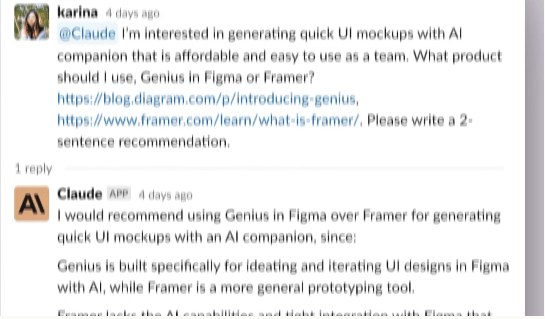OpenAI has released a voice-capable ChatGPT iPhone app, and Anthropic has introduced a neat Slack plugin for its own AI assistant Claude, which is similar to ChatGPT but notably quicker, and able to access the internet and handle much more text.
The free ChatGPT app, released yesterday, is a super-simple looking app that lets you log in to your OpenAI account, and access ChatGPT in a mobile setting without resorting to your Web browser. It’ll sync your conversations across devices, and give you access to GPT4 if you’ve bought a ChatGPT Plus subscription.
The ChatGPT app also features OpenAI’s own Whisper tool, enabling voice input – although you could achieve something similar by simply enabling dictation on your iPhone keyboard.
Perhaps more interesting is the way Anthropic has integrated its own AI assistant, Claude, into Slack. Claude is a large language model (LLM) like GPT, capable of multilingual natural-language conversations and writing software code.
Anthropic has released a Slack plugin that brings Claude directly into your team. Given appropriate permissions, Claude is able to see and respond to any thread he’s tagged in, or any direct messages you send it.
The model can access websites if you give it links, and it has an enormous context window – meaning it can process and understand up to around 70,000 words at once, a significant step up from ChatGPT’s much smaller window. That makes it very capable at tasks like summarizing long websites, transcripts, papers or reports.

Anthropic
Claude doesn’t have a lot of GPT’s stylistic flexibility; he’s locked into one personality, but it’s a helpful and task-focused personality if you don’t mind it being a bit long-winded at times. We’ve integrated it into the New Atlas Slack team, and are trialling it for all sorts of back-end tasks around story selection, sub-editing, headline idea generation and the like.
Note: to be absolutely clear, New Atlas does not use any AI-composed text in our articles, headlines or elsewhere, and nor do we currently have any plans to. You can blame a small group of humans for whatever you read here.
Claude does of course hallucinate and make things up when asked about things without being given access to an authoritative source, and like most LLMs it’s weak when it comes to oddly simple things like maths, which computers have been doing perfectly for decades. But even with caveats, it’s proving a very useful tool. Once these kinds of things are addressed – and it’s hard to imagine that won’t be pretty soon – they’ll go from being handy to being nigh-on indispensable.
Between apps and plugins like these, and the way Google and Microsoft are integrating their PaLM-2 and GPT-4 based chat AIs into everything from email to search and productivity software, these hyper-capable language models are starting to trickle into real-life situations, even for people with no interest in, or knowledge about, the underlying tech.
There’s no turning back, they’re going to be absolutely everywhere before too long. Who wants to place a bet on when we’ll see the first GPT-powered toaster? Wait, let me check… Yep, somebody’s already thinking about it.
Source of Article